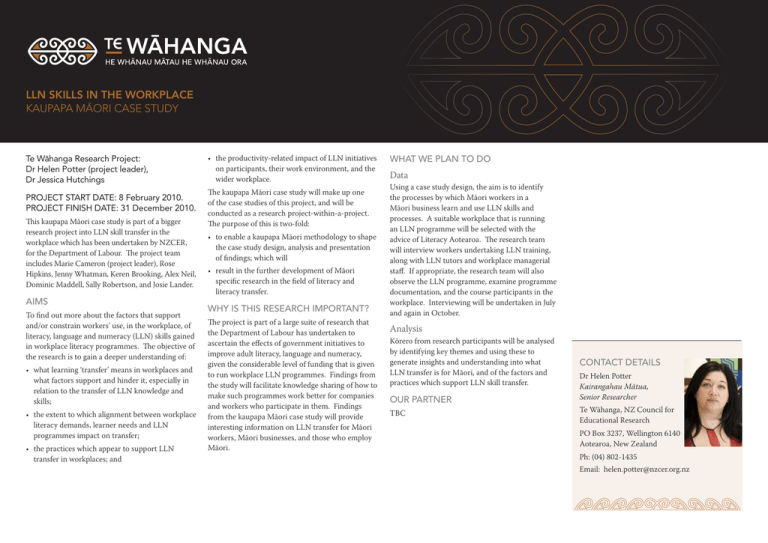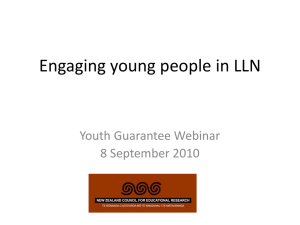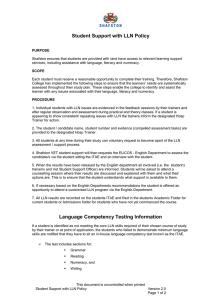LLN SkiLLS iN the WorkpLace KAUPAPA MA
advertisement

LLN Skills in the Workplace kaupapa MAori case study Te Wa-hanga Research Project: Dr Helen Potter (project leader), Dr Jessica Hutchings Project start date: 8 February 2010. Project finish date: 31 December 2010. This kaupapa Māori case study is part of a bigger research project into LLN skill transfer in the workplace which has been undertaken by NZCER, for the Department of Labour. The project team includes Marie Cameron (project leader), Rose Hipkins, Jenny Whatman, Keren Brooking, Alex Neil, Dominic Maddell, Sally Robertson, and Josie Lander. Aims To find out more about the factors that support and/or constrain workers’ use, in the workplace, of literacy, language and numeracy (LLN) skills gained in workplace literacy programmes. The objective of the research is to gain a deeper understanding of: • what learning ‘transfer’ means in workplaces and what factors support and hinder it, especially in relation to the transfer of LLN knowledge and skills; • the extent to which alignment between workplace literacy demands, learner needs and LLN programmes impact on transfer; • the practices which appear to support LLN transfer in workplaces; and • the productivity-related impact of LLN initiatives on participants, their work environment, and the wider workplace. The kaupapa Māori case study will make up one of the case studies of this project, and will be conducted as a research project-within-a-project. The purpose of this is two-fold: • to enable a kaupapa Māori methodology to shape the case study design, analysis and presentation of findings; which will • result in the further development of Māori specific research in the field of literacy and literacy transfer. Why is this research important? The project is part of a large suite of research that the Department of Labour has undertaken to ascertain the effects of government initiatives to improve adult literacy, language and numeracy, given the considerable level of funding that is given to run workplace LLN programmes. Findings from the study will facilitate knowledge sharing of how to make such programmes work better for companies and workers who participate in them. Findings from the kaupapa Māori case study will provide interesting information on LLN transfer for Māori workers, Māori businesses, and those who employ Māori. What we plan to do Data Using a case study design, the aim is to identify the processes by which Māori workers in a Māori business learn and use LLN skills and processes. A suitable workplace that is running an LLN programme will be selected with the advice of Literacy Aotearoa. The research team will interview workers undertaking LLN training, along with LLN tutors and workplace managerial staff. If appropriate, the research team will also observe the LLN programme, examine programme documentation, and the course participants in the workplace. Interviewing will be undertaken in July and again in October. Analysis Kōrero from research participants will be analysed by identifying key themes and using these to generate insights and understanding into what LLN transfer is for Māori, and of the factors and practices which support LLN skill transfer. Our partner TBC Contact details Dr Helen Potter Kairangahau Mātua, Senior Researcher Te Wāhanga, NZ Council for Educational Research PO Box 3237, Wellington 6140 Aotearoa, New Zealand Ph: (04) 802-1435 Email: helen.potter@nzcer.org.nz



